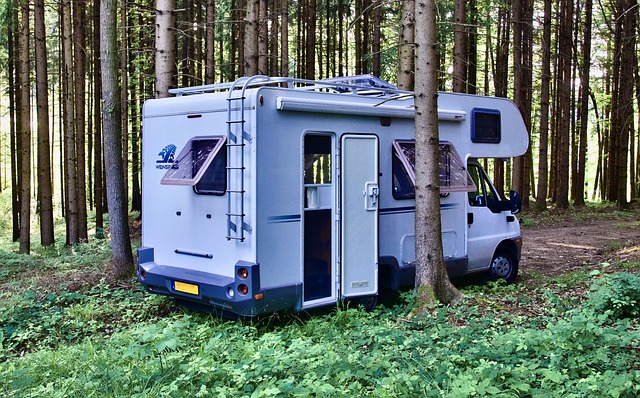A recreational vehicle (RV) and a camper van are two popular options for travelers who enjoy hitting the open road. While both vehicles offer mobility and convenience, there are distinct differences between the two that can impact your decision on which to choose for your next adventure. Understanding the difference between a camper van and an RV is crucial to make the right decision for your travel needs. In this guide, I will explore the definitions, characteristics, similarities, and differences between camper vans and RVs. I will also address the question, “Is a camper van considered an RV?” and provide a comprehensive analysis of the factors involved in answering that question.
Let’s get started!
What is a Camper Van?
A camper van, also known as a campervan or Class B motorhome, is a type of recreational vehicle that is designed to provide both transportation and living accommodations. Camper vans are built on a van chassis, typically a full-size van, and are converted into a living space with sleeping quarters, a small kitchen, and sometimes a bathroom.
Characteristics of a camper van include compact size, easy maneuverability, and the ability to park in smaller spaces compared to larger RVs. Camper vans typically have a lower profile than other types of RVs, making them more fuel-efficient and easier to drive. They also offer a more intimate and flexible camping experience, allowing travelers to camp in remote areas that may not be accessible by larger RVs.
There are different types of camper vans available, including converted cargo vans, pop-up campers, and custom-built campers. They vary in size, amenities, and features depending on the manufacturer and the individual’s preferences.
What is an RV?
An RV, or recreational vehicle, is a motorized or towable vehicle that is designed for both transportation and temporary living accommodations. RVs come in a variety of shapes and sizes, from small towable pop-up trailers to large Class A motorhomes.
Characteristics of an RV include a separate driving and living area, which allows for more spacious living quarters compared to a camper van. RVs often include amenities such as a kitchen, bathroom, sleeping quarters, and entertainment systems. Larger RVs may also feature slide-outs, which expand the living space when parked.
RVs are generally more spacious and comfortable than camper vans, making them a popular choice for long-term travel and camping. They offer more amenities and features, such as larger kitchens, multiple sleeping areas, and more storage space. However, RVs can be more challenging to maneuver and park due to their size, and may not be suitable for remote or off-road camping.
Similarities between Camper Vans and RVs
Despite their differences, camper vans and RVs share some similarities:
- Mobility: Both camper vans and RVs are designed for travel, allowing you to explore different locations while still having access to comfortable living quarters.
- Convenience: Both types of vehicles provide the convenience of being able to travel and live in the same space, eliminating the need to set up and take down a tent or other camping gear.
- Self-sufficiency: Both camper vans and RVs allow for self-sufficient living, with amenities like kitchens, sleeping quarters, and sometimes even bathrooms.
- Outdoor Living: Both vehicles are designed for outdoor living, allowing you to spend time in nature while still having access to comfortable living quarters.
- Customizability: Both camper vans and RVs offer a wide range of customization options, allowing you to personalize your living space to meet your specific needs and preferences.
Differences between Camper Vans and RVs
While there are some similarities between camper vans and RVs, there are also significant differences that can impact your decision on which to choose:
- Size and Capacity. Camper vans are generally smaller and more compact than RVs, with limited space for living quarters, storage, and amenities. RVs are larger and offer more space, allowing for more amenities and comfortable living quarters.
- Mobility and Maneuverability. Camper vans are more mobile and easier to maneuver, making them ideal for traveling on narrow roads, remote areas, and tight parking spaces. RVs, on the other hand, are often larger and more challenging to maneuver and may require specialized driving skills.
- Amenities and Features. While camper vans offer basic amenities like a bed and a small kitchen, RVs typically offer more features, such as full-size kitchens, separate sleeping areas, and entertainment systems. RVs may also have more storage space and larger bathrooms.
- Cost and Maintenance. Camper vans are generally less expensive than RVs, and their smaller size makes them more fuel-efficient and easier to maintain. RVs, on the other hand, can be costly to purchase and maintain and may require specialized service.
- Accessibility. Camper vans are often more accessible than RVs, with easier entry and exit, making them a popular choice for travelers with mobility limitations. RVs may require stairs or steps to enter and exit, which can be challenging for some travelers.
Is a Camper Van Considered an RV?
The answer to whether a camper van is considered an RV depends on the definition used. There is no universally accepted definition of an RV, and different organizations and states have their own definitions and classifications.
From a legal perspective, the definition of an RV varies by state and jurisdiction. In some states, a camper van may be classified as a motorhome or a recreational vehicle if it meets certain criteria, such as having living quarters, cooking facilities, and a bathroom. However, in other states, a camper van may not be classified as an RV and instead may be categorized as a passenger vehicle or a truck, depending on its size and features.
From an industry perspective, camper vans are generally considered a type of RV, specifically a Class B motorhome. The Recreation Vehicle Industry Association (RVIA) defines Class B motorhomes as “motorized recreational vehicles built on a van chassis, with a raised roof, and designed to provide temporary living quarters for camping, travel, or recreational use.”
Factors to consider in determining whether a camper van is considered an RV include the size, features, and intended use of the vehicle. If the camper van has living quarters, cooking facilities, and a bathroom, it is likely to be considered an RV. However, if it is primarily used for transportation and has limited or no living quarters, it may not be classified as an RV.
Overall, whether a camper van is considered an RV depends on the specific definition used, and can vary by state, organization, and context.
Pros and Cons of Camper Vans and RVs
Here are the pros and cons of camper vans and RVs:
Pros of Camper Vans:
- Easy to drive and maneuver due to their smaller size and more compact design.
- Better fuel efficiency compared to larger RVs, which translates into lower operating costs.
- More freedom to explore remote areas and camp in less crowded places due to their smaller size and greater mobility.
- Generally more affordable than larger RVs, both in terms of the purchase price and maintenance costs.
Cons of Camper Vans:
- Limited space for living quarters, amenities, and storage, which can be challenging for longer trips or when traveling with more than one or two people.
- Limited comfort and convenience compared to larger RVs, with fewer amenities and features.
- More difficult to use in extreme weather conditions, such as extreme heat or cold, due to their smaller size and limited insulation.
- May not be suitable for families with children, due to limited sleeping space and amenities.
Pros of RVs:
- Spacious and comfortable living quarters with more amenities, such as full-size kitchens, bathrooms, and multiple sleeping areas.
- More storage space for gear and equipment, making them ideal for longer trips or full-time living.
- More suitable for families with children or larger groups due to their larger size and more spacious living quarters.
- Can be used in extreme weather conditions with greater comfort and convenience.
Cons of RVs:
- More challenging to drive and maneuver due to their larger size and weight, requiring specialized driving skills.
- Lower fuel efficiency compared to smaller vehicles, resulting in higher operating costs.
- More expensive to purchase and maintain than camper vans.
- Limited mobility in narrow or remote areas, makes them less suitable for off-road camping or exploring.
Overall, choosing between a camper van and an RV depends on personal preferences, travel needs, and budget. Camper vans offer greater mobility and affordability, while RVs offer greater comfort and convenience.
Conclusion
In conclusion, while there are similarities between camper vans and RVs, there are also significant differences that should be considered when deciding which to choose for your next adventure. Camper vans are more compact and mobile, making them suitable for exploring remote areas, while RVs offer more amenities and space, making them more comfortable for longer trips or full-time living.
Whether a camper van is considered an RV depends on the definition used, and can vary by state, organization, and context. Ultimately, the decision on whether to choose a camper van or an RV depends on personal preferences, travel needs, and budget.
Regardless of which option you choose, both camper vans and RVs provide the convenience and freedom to explore new places while still having access to comfortable living quarters. With the right planning and preparation, your next road trip or camping adventure can be an unforgettable experience, no matter which vehicle you choose.








